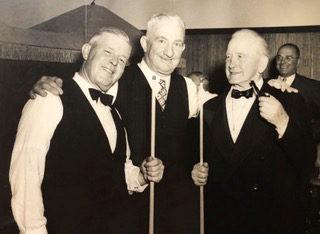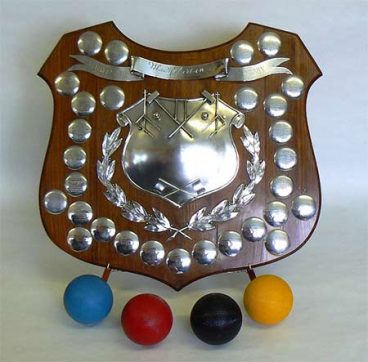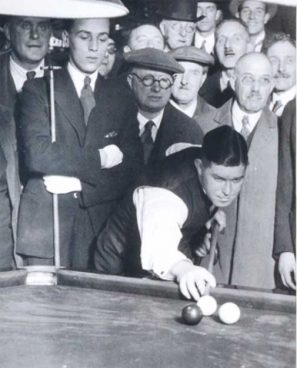 click/tap the image to view at full size
click/tap the image to view at full sizeA big thanks to David Pitt for allowing us to share his thoroughly informative article, “A History of Billiards in Melbourne”, at walterlindrum.org
Extract from “A history of billiards in Melbourne” by David Pitt for the program for the Endeavour Life Care 2019 World Billiards Championship held at the RACV Club Melbourne.
- Article Source: https://www.facebook.com/alcocksbilliards/posts/2901555693390314
- Photo (Walter Lindrum, James Fitzgerald, and Tom Reece taken in 1953) supplied by Michael Fitzgerald of Warrnambool
Walter Lindrum
Volumes have been written about Walter Lindrum, the greatest billiards player the world has ever seen. Much of it has been written by Australians, who might not be completely objective in their estimation of Lindrum. But perhaps the most telling tributes came from England. Willie Smith, who held the world record break of 2743 before Lindrum broke it three times, wrote: ‘Lindrum is the super cannon player to an extent which makes the limit of 35 cannons ball-to-ball look ridiculous. The cushion is a fourth ball to Lindrum. He is never in danger of losing position through having to play on to a cushion first. He makes this contact as easy as playing direct on to the ball. With his all-round skill, he can beat us all practically as he likes’.
His great friend and fellow billiards professional Tom Reece in 1953 was quoted saying: ‘There never was and never will be another with the genius he [Lindrum] has; nor has there come, nor will there, I believe, arise in any other sport, one so perfect in skill and temperament’.
After Lindrum’s death, Joe Davis said: “Walter Lindrum was the greatest billiards player there has ever been or is ever likely to be”. In 2012, the editor of Snooker Scene and doyen of billiards and snooker commentators Clive Everton wrote: ‘Lindrum was, simply, a genius who conquered his sport more thoroughly than any other player has conquered any other’.
Lindrum’s Australian biographer Andrew Ricketts in Walter Lindrum – Billiards Phenomenon drew parallels between Don Bradman and Walter Lindrum. Both Australians emerged as superstars on their first visits to England, Lindrum with his record break of 3262 in December 1929, and Bradman with his record innings of 334 at Headingley in July 1930. Neither could be described as perfect stylists – the celebrated cricket writer RC Robertson-Glasgow said of Bradman: ‘About his batting there was no style for style’s sake … his aim was the making of runs, and he made them in staggering and ceaseless profusion’. Lindrum scored at billiards with equal profusion – his remarkable record includes thousand breaks in five consecutive sessions (1516, 1412, 1054, 1875, and 1052) against Clark McConachy: successive breaks of 2835, 451, 1796, and 2583 against Tom Newman, and his world record break of 4137 against Joe Davis. Robertson-Glasgow again: ‘Like his fellow countryman Walter Lindrum in billiards, he (Bradman) sought and achieved a numerical standard not previously contemplated’. Neville Cardus, the greatest of cricket writers, wrote in his 1930 essay on Bradman: ‘And now that a Bradman has come to us, capable of 300 runs in a single day of a Test match, some of us are calling him a Lindrum of cricket!’
The 1934 World Billiards Championship in Melbourne
After defeating Joe Davis to win the World Championship for the first time in London in 1933, Walter Lindrum caused great controversy in the billiards world by announcing his intention to defend his title in his native country.
Predictable outrage in England was stymied by the fact that Lindrum was undoubtedly the best player, and that he had brought the Championship trophy with him back to Australia. Lindrum’s 1934 title defence was organised by the Australian Amateur Billiards Council to coincide with Melbourne’s Centenary celebrations. The Championship was staged at the Victorian Railways Institute Ballroom at Flinders Street Station in October 1934 and opened by the Australian Prime Minister Joseph Lyons at the invitation of Captain AM Treacy OBE, the President of the Amateur Billiards Council.
Lindrum, having defeated New Zealand’s Clark McConachy in a heat, met Joe Davis in a match of two weeks’ duration. Davis led for the first week, and the lead alternated during the first three days of the second week before Lindrum, helped by a 1475 break, hit the front and was not headed again, winning 23,553 to 22,678.
Davis returned to England and turned his attention to snooker. Lindrum remained in Australia and retained the title of World Billiards Champion, unchallenged, until he relinquished the title in 1950. Billiards languished, killed off by the excellence of its leading practitioner and surpassed in popularity by snooker which now holds the premier position in cue sports held for so long by billiards.
Please read Walter Lindrum’s “Timeline“, which unveils his unique upbringing, illustrious career, and philanthropic endeavours in his retirement.




